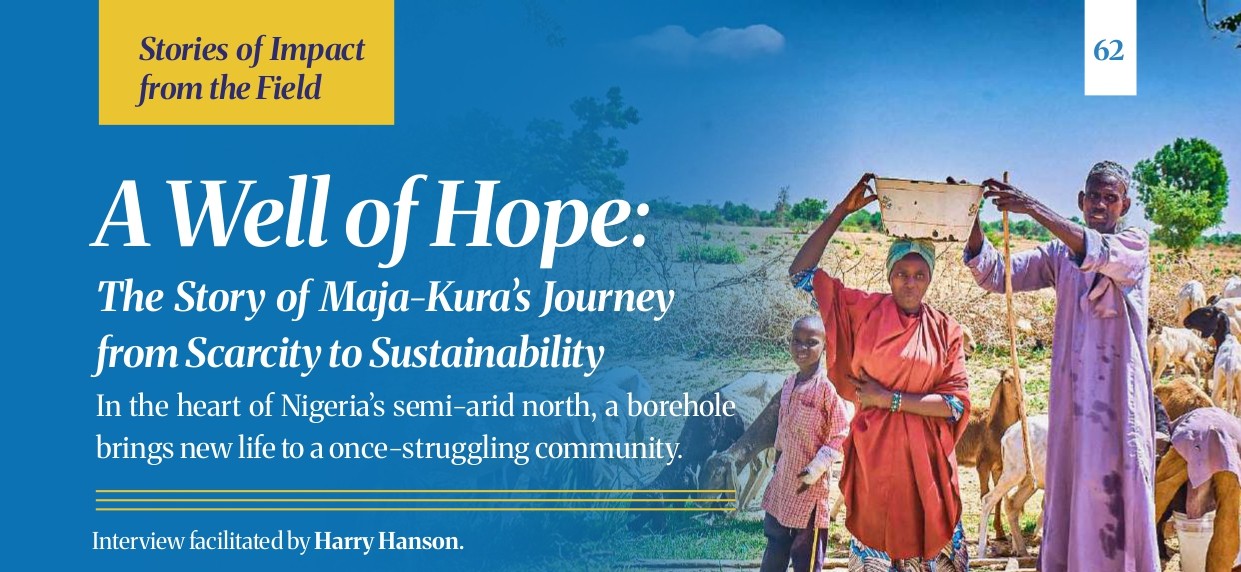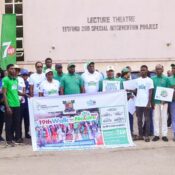
A Well Of Hope: The Story Of Maja-Kura’s Journey From Scarcity To Sustainability.
In the heart of Nigeria’s semi-arid north, a borehole brings new life to a once-struggling community.
In 2017, the Nigerian Conservation Foundation (NCF) launched its flagship Green Recovery Nigeria (GRN) initiative — an ambitious 30-year project aimed at restoring 25% of Nigeria’s forest cover through reforestation, afforestation, and natural regeneration. Backed by visionary partners like First Bank of Nigeria (FBN), the GRN programme is not just about trees; it’s about healing land, restoring ecosystems, and breathing life back into communities. As part of this broader vision, the NCF and FBN co-funded the drilling of a borehole in Maja-Kura community, Nguru Local Government Area of Yobe State — a gift of life for a people long besieged by water scarcity. Three community members were interviewed to share their experiences and struggles.
Nestled deep in Nigeria’s semi-arid northeast, Maja-Kura — a community made up of 10 villages and 16 settlements — are a tapestry of resilience. The community located in Nguru Local Government Area of Yobe State with international border with Niger Republic is a hot semi-arid area that makes getting water a real struggle especially during the dry season. With a population of over 3,000 people, their survival hinges on rain-fed farming and livestock rearing — livelihoods made perilous by harsh climates and dwindling water sources. For most of the year, rain falls for barely three months, leaving long stretches of parched land, dry wells, and desperate treks in search of water.
The inhabitants of the various settlements had to travel far in search of drinking water, for domestic use and for the livestock. The only available water source was at the village centre, which based off their proximity to it could mean a one, two-, or five-hours trip to and from it.
“From our settlements to the village centre takes about two hours of trekking, at times, you will have to wait for long for your turn to fetch. Because of this, we often went to our farms without drinking water.” says Mohammed Abubakar, a youth in the community.
Before the borehole was installed, fetching water was an exhausting ritual woven into daily life. Hajia Amina Sulaiman, speaking for the women of Maja-Kura, recalled the burden they carried:
“We used to lose valuable time in search of water for our domestic chores in the past. Some of our women are old so our young girls do the travels in search of water every morning before they go to school. In most cases, these girls return from fetching water late to go to school, and this use to be a daily routine.”
“You know, going to the village centre to get water for a day use in a family of six people or more, we will have to waste more than five of our productive hours, and by the time we are done doing it, we become so tired to do other domestic activities for the day. Our daughters missed school because they spent mornings searching for water instead of learning.”
Waiting hours in long queues under the scorching sun became a painful routine. The scarcity of water strained households, endangered livestock, fuelled conflict between farmers and herders, and pushed many girls permanently out of school.
Farming for these communities is tied to the rainy season. Anything short, results in a poor harvest. Same cannot be said of livestock farming. Livestock farming requires water all year round. Cattle rearers travels with their livestock for hours in search of water points for their livestock to drink especially during dry seasons. These movements in search of water have always resulted in conflicts between crop farmers and livestock rearers in the communities.
Research by UNICEF shows that over 18 million children are out of school in Nigeria and a huge contributing factor to this are poverty, insecurity, and poor infrastructure. This infrastructural deficit is clearly seen in the struggles of the Maja-Kura community.
Because of how hot it gets in the afternoon and the dangers of insecurity that lurks in the evenings, girls and women must go look for water in the morning. The village head further emphasizes how close to home the situation hits, “We struggle a lot as a community because of water scarcity. It results in increased number of out-of-school girl children, waste of productive hours for women, and poor person and family hygiene.”
“Schools in our community resumes at 8am daily. Children leave home in search of water at about 6am, before they could fetch water that will last the whole day need at home, it is already closed to noon day. With this, by so doing, children missed class thereby affecting learning process,” Mohammed shares.
In many communities that struggle with water scarcity, they are often forced to manage with what they have. In cases where they can’t get clean water, they are forced to use brown water or recycle water that has already been used for one purpose to another. Water used to bathe can be harvested and re-used to wash clothes. All these further exacerbate the risks of common illnesses like diarrhoea, dysentery, and typhoid.
The situation was no different for the men and youth. Mohammed Abubakar explains the toll it took on farming and health:
“We need a lot of water to maintain hydration especially during hot period like now. Lack of enough drinking water in the home to meet the body requirements do result to ill health among our children. Sometimes children would fall sick from dehydration and poor hygiene.”
“Water is life,” said the Village Head of Maja-Kura. “Before NCF and First Bank intervened, life was extremely difficult. Water scarcity made our women weaker, our children sicker, and our livestock more fragile.”
That reality changed the day water gushed from the new borehole at the NCF plantation site — a moment many describe with deep emotion.
“When I first saw the water flowing,” Hajia Amina said, smiling, “I was so excited — it felt like help had finally come for our women and children.”
Mohammed Abubakar recalled, “We were very excited. It was like a heavy burden lifted from our shoulders.”
The location of the NCF Tree plantation site and the borehole is very strategic. The trees will grow and help reduce the impact of drought in the community. While the water will tend to the surrounding human settlements, drastically improving their access to water.
“Now we have unhindered access to the borehole for domestic needs, drinking water on the farms, and also watering point for our livestock. The issue of traveling long distances for domestic water use is now over.”
“Children can now go to school, burden of women spending their productive hours in search for household water needs is also over, all day movements by cattle rearers in search of water points for their livestock is over too,” the village head shared.
Hajia Amina with palpable excitement reflected on the change, “We are so happy now because we no longer travel for hours to fetch water for our home use. Our home hygiene has also improved, reducing water-borne related diseases and sicknesses in our communities/settlements.
“We the women now have enough time to attend to our domestic chores. We as mothers are now happy to see our children attend school and thriving.”
The impact has been transformative. Today, approximately 3,000 people now have easy access to clean water for drinking, cooking, hygiene, and livestock. Children are attending school again, girls especially. Women now invest their time in productive activities instead of endless treks. Hygiene and health have improved markedly, reducing the prevalence of water-borne diseases. Farmers tend their fields with strength, and cattle drink without conflict.
The borehole also plays a crucial role in the survival of the tree plantation established under the Green Recovery Nigeria initiative. In a region with such harsh, dry conditions, the young trees now receive the life-giving water they need to thrive. Thanks to community-led Site Support Groups, the plantation’s survival rate has soared — a double victory for nature and people.
Reflecting on the gift, the Village Head of Maja-Kura said with gratitude:
“On behalf of the good people of Maja-Kura, I say a big THANK YOU to NCF and First Bank. You have improved our living standards, restored the dignity of our women, and brought hope to our children’s future.”
From parched fields to flowing hope, the story of Maja-Kura is a testament to the profound power of restoration. When we heal the land, we heal lives and with every drop of water, a future is nurtured.



